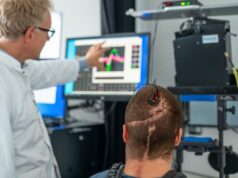
Synchron has announced positive results from the COMMAND study evaluating the safety and efficacy of the company’s Stentrode brain-computer interface (BCI) device in six patients over a 12-month period.
The study results were presented yesterday at the 2024 Congress of Neurological Surgeons (CNS) annual meeting (28 September–2 October, Houston, USA) by Elad Levy (Jacobs Institute/University at Buffalo, Buffalo, USA). Levy is a co-principal investigator for the COMMAND study alongside David Lacomis (University of Pittsburgh, Pittsburgh, USA) and David Putrino (Mount Sinai Health System, New York, USA).
“The COMMAND study results represent a major medical milestone, confirming the safety of the Stentrode BCI with no neurologic safety events reported during the 12-month study period,” said Levy. “This minimally invasive approach has the potential to unlock BCI technology at scale for the millions of patients with paralysis and other mobility challenges.”
With support from the National Institutes of Health (NIH) BRAIN initiative, COMMAND was conducted at three US clinical sites and enrolled six patients with severe chronic bilateral upper-limb paralysis who were unresponsive to therapy, all of whom received the BCI implant.
All six patients successfully met COMMAND’s primary endpoint of no device-related serious adverse events resulting in death or permanent increased disability during the one-year post-implant evaluation period. Additionally, the results have reported that patients had no serious adverse events (SAEs) related to the brain or vasculature during the 12-month study period.
As stated in a press release from Synchron, the study also demonstrated that brain signals related to motor intent can be consistently captured and transformed into digital motor outputs (DMOs)—allowing participants to successfully perform a range of digital tasks. In 100% of cases, the Stentrode device was accurately deployed, demonstrating a median deployment time of 20 minutes and achieving target motor cortex coverage in the brain for all six patients.
“The users were able to generate DMOs with the BCI. These are simple, thought-derived expressions of intent, converted into digital actions on computers,” said Tom Oxley, Synchron’s chief executive officer and founder. “Making the DMOs easy to use, stable over time, and generalisable across technology platforms, will unlock layers of independence and autonomy for patients.”
The COMMAND study is the first US Food and Drug Administration (FDA)-approved investigational device exemption (IDE) trial of a permanently implanted BCI, according to Synchron.
The company’s BCI is implanted in the blood vessel on the surface of the brain’s motor cortex via the jugular vein, utilising a minimally invasive endovascular procedure. Once implanted, it is designed to detect and wirelessly transmit motor intent out of the brain with the goal to restore the capability for severely paralysed people to control personal devices through hands-free, ‘point-and-click’ techniques.









